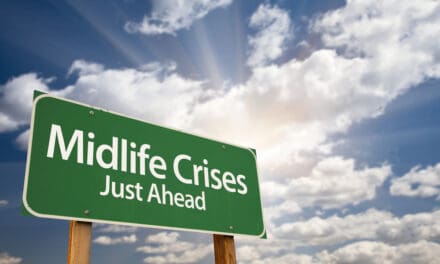The concept of a midlife crisis is fraught with debate. Perhaps it is a myth. Maybe it occurs in so many distinct varieties that it’s difficult to explain. There is minimal evidence that Japanese and Indian cultures have midlife crises, raising whether a midlife crisis is primarily a western cultural construct.
Even yet, many people have feelings of being washed up or questioning the value of their life. They may adhere to the traditional cliché of purchasing a sports vehicle or embrace the contemporary trend of extreme sports.
Whether you go to a Ferrari dealership or an expensive gym membership, the reaction is frequently more influenced by specific experiences than by age. A trigger, such as a divorce or the loss of a parent, is often present.
Fortunately, these shifts present both excellent possibilities and difficulties.
I’m going to cover what to do if you or your partner is experiencing a midlife crisis. First, let’s first look at what is a midlife crisis.
Table of Contents
What is a Midlife Crisis?
The phrase “midlife crisis” has been used since the 1960s. It depicts a typical shift in both men and women from being youthful to older adults. Some people begin to suffer from the passing of their youth between the ages of 40 and 60.
A midlife crisis can cause you to evaluate your life, achievements, and dreams. Most people work their way through their midlife crisis without much trouble, quickly regaining balance. Others struggle with depression or anxiety as they face the next stage of their life. [1]
A midlife crisis might force you to reflect on your life, accomplishments, and ambitions. Most people breeze through their midlife crises, swiftly recovering their equilibrium. Others experience despair or worry as they prepare for the next stage of their lives.
For many people, midlife is a period of transition in their relationships and roles. Some people may need to start caring for elderly parents in their forties. Others may find themselves empty nesters or feel that their adolescents are growing up too quickly.
Midlife Crisis Signs and Symptoms
The symptoms of a midlife crisis differ significantly from person to person. The most typical age range for a midlife crisis is 40 to 60, with significant variation between genders.
Many of the symptoms of a midlife crisis and depression and perimenopause or menopause coincide. Figuring out what’s going on might be difficult because much mental health or hormonal changes may be present at the same time.
Consider the following signs and symptoms of a midlife crisis that are common to both men and women [2]:
- Emotions of unfulfillment in life
- Intense feelings of nostalgia, continuous reminiscing about the past
- Feelings of boredom, emptiness, and meaninglessness
- Impulsive, frequently hasty acts
- Dramatic changes in behavior and appearance
- Marital adultery or persistent thoughts about infidelity
- Strong emotions of remorse
Coping with Your Midlife Crisis
If you face a midlife crisis, here [3] are some tips on dealing with it.
Consider your options before acting – If you’re inclined to quit your job or have an affair, take it easy. You may want to make drastic changes in your life but think about the repercussions first to prevent losing what you cherish.
Make new objectives for yourself – Give yourself something to look forward to. Consider a second job or conduct more community service. Move to another place or return to education.
Shape up – A healthy lifestyle can reduce the risk of several aging-related illnesses. Create a balanced program that includes cardio fitness, strength, flexibility, and balance training. Select activities that are suitable for your age and skill.
Assess your priorities – Have your children left home? Are you tired of shopping sprees and office politics? Reflect on what having a meaningful life means to you now.
Examine your priorities – Have your children moved out? Are you sick of workplace politics and spending sprees? Consider what living a meaningful life means to you right now.
Consult your doctor – Hormonal fluctuations and other physical elements of aging might have an impact on your thoughts and emotions. Consult your doctor to see if there is any medical reason for your predicament and if you need any help.
Talk about it – When you’re feeling down, reach out for help. Inform your family and friends about how they may assist you. They may have some experience in dealing with a midlife crisis or at least be able to help.
It is easy to ignore your feelings of frustration and hopelessness, thinking that they will eventually go away. However, suppressing these feelings is not helpful. And neither is trying to drown them in alcoholism and drugs. Instead, you should acknowledge the specific concerns by keeping a daily journal or letting a loved one know. A journal will help you understand your feelings and thoughts and determine what is causing you the stress in your career and life.
Start the process of your self-discovery by asking yourself open-ended questions about your life. Ask yourself when you feel most content, who you like sending time with, and how to care for your needs. Doing this will help you get out of the rut.
Instead of keeping your feelings to yourself, talk to someone you trust, including your doctor, a partner or friend, a life coach, a trained counselor, or a therapist. Some midlife crisis symptoms lead to people feeling hopeless and having suicidal thoughts. Ignoring such feelings could have severe effects on your health.
Accept Your Creative Side – We all have a creative side. However, most people ignore their creative impulses due to a lack of time or believe they are not as talented. However, the best way to reconnect with yourself is by tapping into your creativity.
Begin seeing your life as a significant art project and keep feeding your creativity. You can start writing a book or even a memoir. You will be surprised by the numerous thoughts in your head waiting to be put down on paper.
You can also learn a new skill or nurture a hobby. When you embrace your creativity, you release true feelings of joy while engaging your brain to remain active and young as you age.
Adopt Some Changes – Midlife gives you a chance to adopt some changes in your life. It could be changing the color of your walls, losing some weight, making a career change, or getting out of some unhealthy friendships. Start making changes based on your needs and not those of others.
Although you might find this difficult and begin experiencing feelings of guilt, don’t think you are selfish. If you struggle with this, it is time to reevaluate your boundaries. If you find out that someone in your life is bothered by you starting to care more about your interests, they don’t have your best interests in mind, and it might be the time to get them out of your life.
Spend Time with Like-Minded People = You need social interactions for a healthy and happy life. However, many people spend most of their adult lives around people they don’t like or are not aligned with. These could be your colleagues at work.
It is time to change that narrative and surround yourself with like-minded people who share your interests, passions and support and inspire you to be your best self. Reconnect with your old friends or get involved in community activities where you are likely to meet like-minded people.
Helping with Your Partner’s Midlife Crisis
The techniques listed below will assist you in dealing with your partner’s midlife crisis.
Don’t forget your needs as well – If your significant other is through a midlife crisis, it impacts you as well. While you’re watching out for your spouse, remember to take care of your needs and family commitments. Set and keep to acceptable boundaries.
Offer empathy – You may disagree with some of your spouse’s new decisions, but you may try to understand their motivations. Listen to their point of view and demonstrate that you care.
Exercise patience – Relationships experience ups and downs. While you’re going through a difficult time, remember what you love about each other. Focusing on your love for each other is essential as a midlife crisis can strain your relationship.
Have some fun – When was the last time you and your partner relaxed and enjoyed each other’s company? Cook your favorite meal together and eat it on the terrace or go somewhere for a date night. Take up a hobby or interest that both of you can enjoy.
Consider getting some counseling – If you believe you want more support, speak with a professional therapist specializing in relationships and aging. If your partner is hesitant to participate in couples counseling, you should attend on your own.
In Conclusion
You and your partner can emerge from a midlife crisis with more wisdom and enthusiasm for the years ahead. Protect your quality of life by taking care of your health, cultivating close relationships, and setting inspiring goals.











